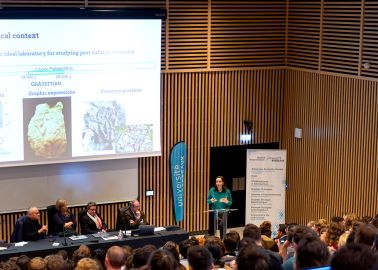- The Humanities & Social Sciences award was awarded to Paola AYBAR JIMENEZ (Doctoral School of Economic Sciences, Management and Demographics) for her research work on the following topic: “Optimizing the financing access in Latin America: the case of the Dominican Republic microenterprises”, supervised by Gérard HIRIGOYEN and Pedro ARBULU (IRGO).
- The Science & Technology award was awarded to Antonio CASARES-SANTOS (Doctoral School of Mathematics and Computer Science) for his research work on the following topic: “Structural properties of automata over infinite words and memory for games”, supervised by Igor WALUKIEWICZ and Nathanaël FIJALKOW (LaBRI).
- The Biology & Health award was awarded to Jeanne NEUFFER (Doctoral School of Society, Politics, Public Health) for her research work on the following topic: “Nutrition, lifestyle and prevention of brain aging: characterization of combinations, mechanisms and risk groups using molecular epidemiology”, supervised by Cécilia SAMIERI (BPH).
- The Special international jury award was awarded to Elise CLAVÉ (Doctoral School of Physics and Engineering) for her research work on the following topic: “Multi-technique spectroscopy analyses with SuperCam, Mars 2020 -- Application to carbonate characterization”, supervised by Bruno BOUSQUET (CELIA).
Humanities & Social Sciences award
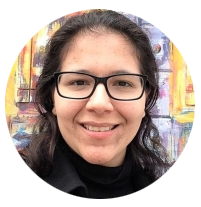 Paola AYBAR JIMENEZ was awarded the Humanities and Social Sciences award for her research work on the following topic: “Optimizing the financing access in Latin America: the case of the Dominican Republic microenterprises”.
Paola AYBAR JIMENEZ was awarded the Humanities and Social Sciences award for her research work on the following topic: “Optimizing the financing access in Latin America: the case of the Dominican Republic microenterprises”.
The aim of her thesis is to identify the key factors enabling financing for Dominican microenterprises. “Microenterprises represent the majority of companies in the Dominican Republic. I therefore met Dominican entrepreneurs and studied several criteria to meet the objectives”.
Her research work led to the classification of the results into four main categories: the entrepreneurial and financial approach, the different strategies and sources of financing, proximity and other factors such as business plan, pitch, and team.
The thesis prize was a great opportunity to show and explain my results to an international jury. I was motivated by the idea of presenting my subject through an innovative approach that differed from traditional financial theory, and through a qualitative methodology.
Science & technology award
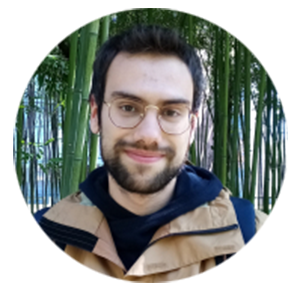 The jury awarded the Science and Technology award to Antonio CASARES-SANTOS for his research work on the following subject: “Structural properties of automata over infinite words and memory for games”.
The jury awarded the Science and Technology award to Antonio CASARES-SANTOS for his research work on the following subject: “Structural properties of automata over infinite words and memory for games”.
Through his thesis, Antonio studies transformations between different types of omega-automata, as well as the minimisation problem. Moreover, he exhibits links between these automata and the complexity of winning strategies for games with omega-regular winning conditions, giving a complete characterisation of half-positionality for omega-regular languages.
For Antonio, who has continued into a post-doctoral fellowship, this award represents an additional asset for his career.
Participating in the thesis prize was an opportunity I couldn’t miss. As the jury was interdisciplinary, I had to present my thesis in the most pedagogical way possible…It was the first time I had done this!
Biology & Health award
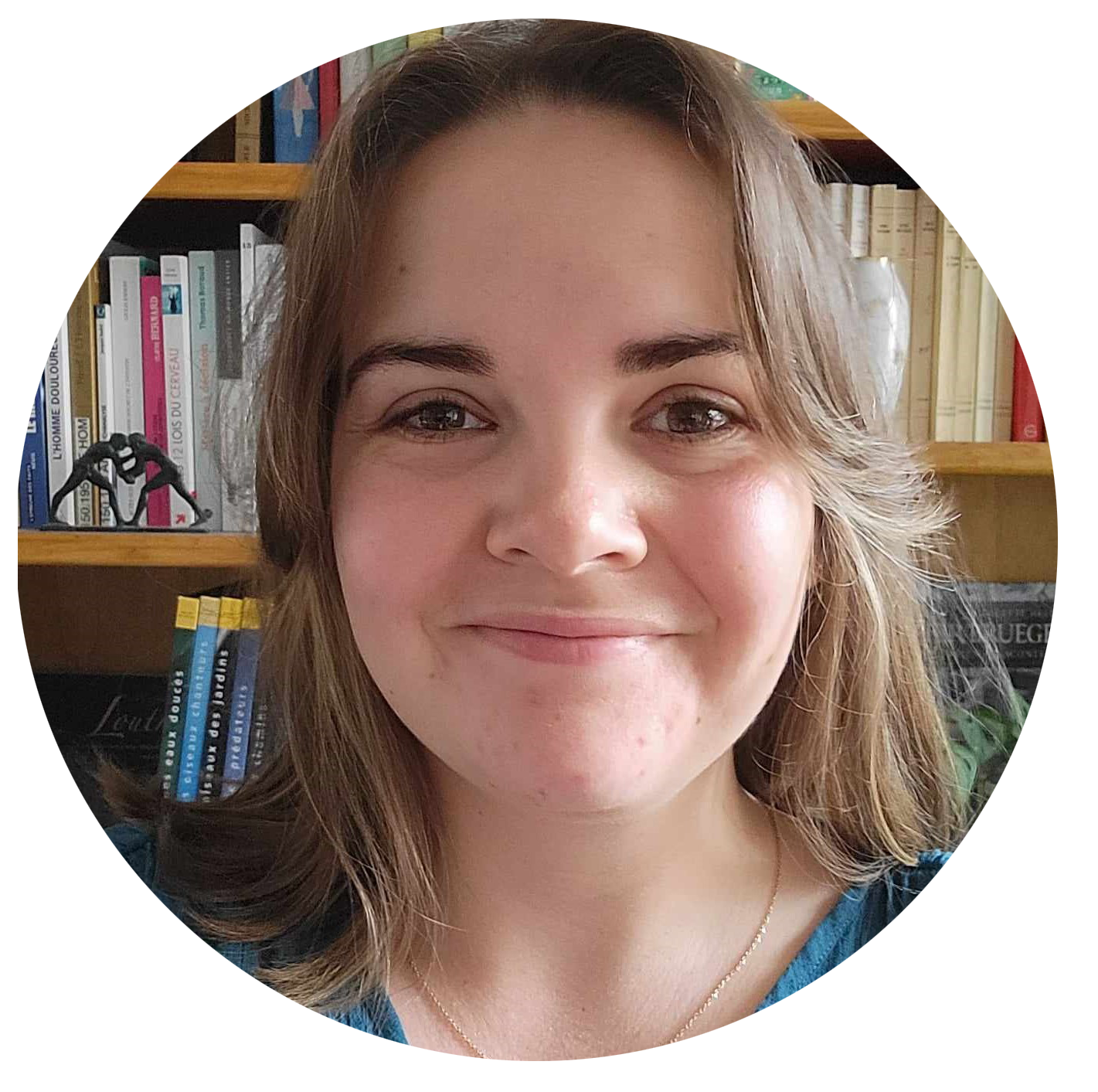 Winner of the Biology & Health award, Jeanne NEUFFER carried out her research work on the following topic: “Nutrition, lifestyle and prevention of brain aging: characterization of combinations, mechanisms and risk groups using molecular epidemiology”.
Winner of the Biology & Health award, Jeanne NEUFFER carried out her research work on the following topic: “Nutrition, lifestyle and prevention of brain aging: characterization of combinations, mechanisms and risk groups using molecular epidemiology”.
“My thesis focuses on Alzheimer's disease and dementia in order to understand how to improve prevention through nutrition and lifestyle. I tried to identify groups of people for whom changes in lifestyle and nutrition could reduce the risk of developing an age-related brain disease”.
To conduct her researches, Jeanne used a French study using biostatistical approaches to analyse data from a large number of elderly people, including lifestyle, nutrition, cognitive performance and molecular data.
I was interested in presenting my thesis to a wider audience. I was curious to see how I'd prepare and how it would go. This prize is also the ultimate reward for these three years of research work!
Special international jury award
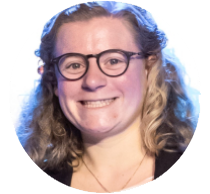 Élise CLAVÉ was awarded the Special international jury award for her research work on the following topic: “Multi-technique spectroscopy analyses with SuperCam, Mars 2020 -- Application to carbonate characterization”.
Élise CLAVÉ was awarded the Special international jury award for her research work on the following topic: “Multi-technique spectroscopy analyses with SuperCam, Mars 2020 -- Application to carbonate characterization”.
Élise carried out her thesis as part of the Mars 2020 space mission (NASA). She used "SuperCam", one of the instruments on the Perseverance Rover, to analyze the rocks around the rover.
“I applied a combination of different analysis techniques, which had never been used together on Mars before. The aim is to get more precise results in order to better characterize the carbonates”.
Currently on a two-year post-doctoral fellowship at the German space agency DLR, Élise participated in the prize to share her unique experience with the jury.
I worked in a fascinating international environment! It was demanding but stimulating in every way. Participating in the thesis prize was a great opportunity to present the highly technical topic which I worked on. Still, people are curious about it as it deals with space exploration.
For Antonio, Elise, Jeanne and Paola, the thesis prize represented a real opportunity to explain and highlight their research works to an interdisciplinary audience. Each of them underlined the kindness of the jury, the relevant questions and interesting exchanges.
As part of the award, they will be invited to present their research works to new PhD students at the PhD Welcome Ceremony at the end of the academic year.
Congratulations to the winners!


